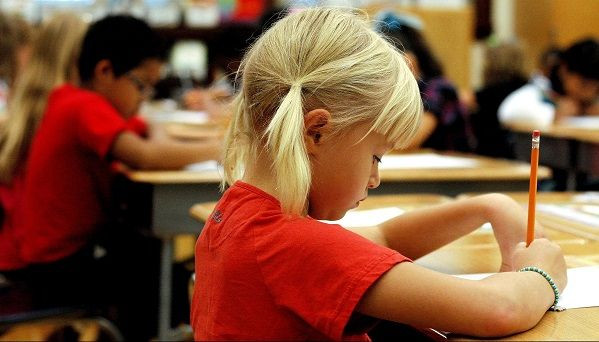Genes Are Pretty Important To Academic Success, But Changing The Learning Environment Could Help Those Who Fall Behind

Many parents want to believe that their kids are the smartest and most successful people, at least until they see their kid crashing and burning. Unfortunately, not everyone is intelligent, and not every kid will go on to outperform the rest in school. That determination is made by genetics, or at least partially, according to a new study from King’s College London.
“The idea that children can inherit the ability to get good results at school can spark heated debate,” wrote co-authors of the study Eva Krapohl and Kaili Rimfeld in the NewStatesman. “But, put simply, all this means is that children differ in how easy and enjoyable they find learning, and that these differences are to a large extent explained by differences in their genes, rather than differences between schools or teachers.”
The study, published in the Proceedings of the National Academy of Sciences, looked at test scores from the UK’s stardardized exam, the General Certificate of Secondary Education (GCSE), among both identical and non-identical twins. The students were also gauged on nine psychological factors, including self-belief, personality, behavior problems, wellbeing, and perceptions of the school environment. The two groups were then compared to see where identical twins outperformed the others, which would indicate that, since they share each and every gene, the influence was genetic.
They found that genes influenced performance on the English, math, and science GCSE exams about 62 percent of the time, while influencing the other psychological factors only 35 to 58 percent of the time. Although intelligence genes made up a good part of whatever genetic influence went into academic performance, the genes responsible for the other factors combined swayed performance about just as much. Altogether, the researchers said this combination of genes influenced about 75 percent of performance.
So, what about that other 25 percent or so? The researchers believe that educational inequality accounts for that, and it’s probably true. Standardized testing throughout school districts in the U.S., and elsewhere, has led to a one-size-fits-all approach to teaching. Teachers’ curriculums are based on getting their students to succeed in the exams. That means kids aren’t getting the personal attention they need, and their creativity, critical thinking, and other necessary skills for the real world. By showing kids personal attention, and catering to their specific needs, those who lack the genetic influence may be able to compete.
“Education is more than what happens passively to a child,” the researchers wrote. “Children are active participants in selecting, modifying, and creating experiences that are matched to their genetic predispositions. … At the practical level, our findings add support for the trend in education toward personalized learning rather than a one-size-fits-all model. None of this means that schools, parents, or teachers aren’t important. Of course they are, and each has an important role in helping children achieve the best of their potential.”
Source: Karpohl E, Rimfeld K, Shakeshaft N, et al. The high heritability of educational achievement reflects many genetically influenced traits, not just intelligence. PNAS. 2014.



























